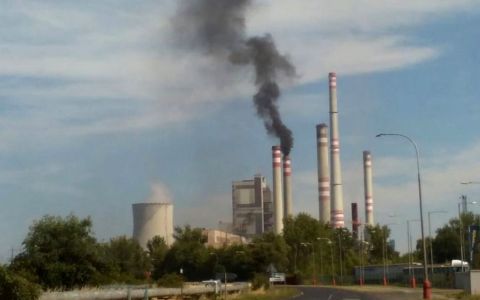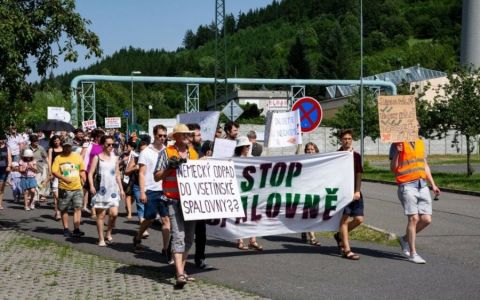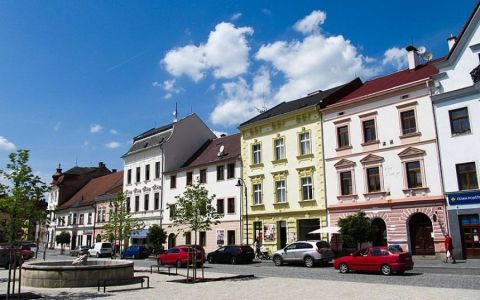The Ostrava region has become a European symbol of polluted air: 93 % of the inhabitants are dissatisfied with the situation caused mainly by high density of heavy industry. According to them, air pollution together with insufficient environmental protection are an urgent problem. One of the reasons of the appalling state of air pollution is also ArcelorMittal, the biggest smelting facility in the Czech Republic, which has been postponing the necessary improvements for many years. Year-round measurements signalize that health limits are being exceeded by hundreds of percent near the steelworks.
People in and around Ostrava are breathing a mixture of airborne dust, polycyclic aromatic hydrocarbons and heavy metals, and thus suffer from breathing difficulties, asthma and generally a higher sickness rate. Therefore, in 2002 the residents of the most affected districts Radvanice and Bartovice, i.e. the areas next to the steelworks where for example childhood asthma rate is three times higher than in the rest of the Czech Republic, established a civic organization called Vzduch ("Air"). They started to urge ArcelorMittal to take responsibility for the serious consequences of their business. The open civic association „Sky above Ostrava" was established in October 2008. They based their activities on a public appeal addressed to ArcelorMittal: six points offering a system solution to the issue. The association wants to force the company to run modernized steelworks which will not have a serious impact on public health.
Lawsuits and protests
In a short time around 2 300 signatures were gathered for a petition that urged the steelworks to invest into arrangements that would lead to fulfilling the emission limits for air. However, at the same time the company made first steps to build a new galvanizing plant with tree times higher capacity and gained permission to increase production in the steel mill, one of the worst facilities regarding air pollution. The citizens, frustrated by this situation, when neither state nor the company were solving the problems at hand, and when the increasing production was creating more and more pollution, organized the first demonstration for clean air in Ostrava in 2008. Additionally, four lawsuits were filed, where the citizens demanded protection of their health. The top executives of ArcelorMittal were under pressure and thus agreed to meet the citizens. However, the round table discussion did not lead to any concrete conclusions. Although the steelworks offered some partial arrangements, the impact of those on the air pollution would not be sufficient. The amount of dust would decrease by roughly ten percent only.
Still no end in sight
In 2009, ArcelorMittal announced their plan of reconstructing the facility for continuous casting of steel and the process of environmental impact assessment (EIA) began. The company declared that the aim was to improve the quality of production, and that the production of steel would not be increased, and so the emission levels would remain the same and not grow significantly. The citizens, however, proved this statement false after an analysis of the project documentation. The Ministry of the Environment agreed with most of what the civic organization Vzduch said, and even implemented the organization's objections to their own statement. In August 2010, the ministry stopped the reconstruction stating that the suggested compensations are insufficient. The emissions would substantially increase and it would be against valid legislation. For example in October 2011, special filters were installed to decrease dustiness in the forest in Kunčice.
Although ArcelorMittal has at least partially modernized the facility (i.e. in October 2011 special filters to decrease the amount of dust in the Kunčice steelworks were installed), more has to be done in order to really improve the air. Several years later an acceptable solution has not been found. In February 2011, the Ministry of the Environment made an agreement with ArcelorMittal about limiting the burden on the environment, effective until 2015. However, this in fact worsened the situation. According to the agreement, conditions given by the authorities would not be more strict than the arrangements made on ArcelorMittal's own accord. This actually means that the facility will be freed from their obligation to use the best available technologies unless they choose to do so willingly. This agreement has been criticised by the ombudsman in his report. Neither his other conclusions seemed to be very flattering for ArcelorMittal or the government.
The ombudsman stressed that the most efficient solution would be to „replace outdated or non-standard technologies with new high-capacity devices and placing all technological processes - in all the cases when it is technically possible - into closed halls or large boxes with sufficient suction and filtering for emissions." People from Ostrava intend to further enforce such solution in other decision-making processes.
§ By analyzing documentation in the EIA process, the citizens managed to prove a statement of the industrial company, saying the change of technologies would not have a negative impact on the environment, false. This prevented a harmful investment and opened a space for finding a solution.
„As to the air quality, Radvanice and Bartovice are one of the most severe cases in the Czech Republic. According to the results of expert studies the steelworks of ArcelorMittal crucially contribute to this catastrophic situation, and local inhabitants therefore face serious health risks. After several years of experience, I strongly believe that the possibility of our civic organization participating in administrative procedures is crucial for improving the quality of air because, unfortunately, there is still no political will to really solve this problem."
Pavla Skýbová, accountant







